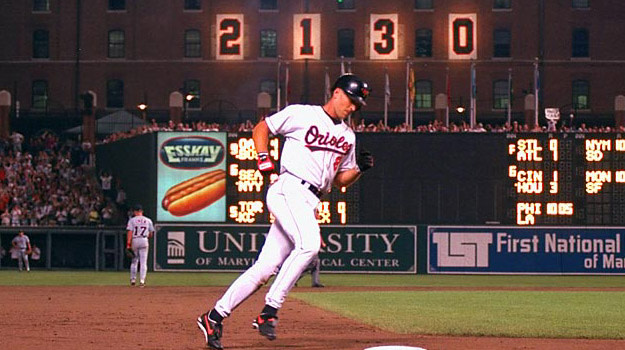On Sept. 6, 1995, Ripken broke the consecutive games played mark set by Lou Gehrig. The Orioles’ star played in his 2,131st consecutive game — eventually, Ripken’s streak made it to 2,632 straight games — and it was an event that took the baseball world by storm.
Baseball was trying to recover the shambles of a 1994 season, one that ended early due to a players’ strike that wiped out much of the last two months of that year and caused 1995 to begin a bit late. The sport had lost a lot of fans who did not understand why players making so much money were on strike. It just seemed to be something many could not comprehend.
The Ripken situation, though, helped bring some popularity back to baseball. Cal Ripken had been a long-time All-Star. He was the type of star seen in many sports — a hometown hero (he was from Maryland) who the Orioles picked in the draft out of high school. Ripken then flourished through his time in the minor leagues and played even better during his early years with the Orioles in the first part of the ’80s.
Ripken helped the Orioles to the World Series championship in 1983 and was literally playing every game. In fact, that’s something he said he wanted to do.
That is likely what made his consecutive games streak so popular among baseball fans across the country and not just in Baltimore.
Ripken sent a message to fans that he wasn’t playing the game just for the money, a message different from what many players sent out on a regular basis. He just loved the game. His father, Cal Ripken Sr., worked in the Orioles’ minor-league system for years before making it to the major leagues as a coach with Baltimore. He also was a manager of the Orioles for just over one year, and his son needed to deal with it when the team fired him just day into the 1988 season.
Even after that, Ripken (and his brother, Bill, also an infielder) just kept on playing. Cal Ripken slowly kept pushing towards the consecutive games record as the weeks, months, and years went on. It was arguably the most popular story in baseball in 1995 as the sport desperately tried to bounce back from the black marks left by the strike.
The Orioles posted four numbers on the warehouse that sits behind right field at Oriole Park at Camden Yards. When the game became official each night, they would change the number to show how the streak had grown. That small “ceremony” grew even more popular as the 1995 season wore on.
The night that Ripken broke the record, the number was changed to 2131 in the fifth inning, and the Orioles pushed him on to the field for a victory lap. He ran out of the first-base dugout and around the warning track in a complete circle. He shook hands with fans along the first-base line, in right field, center field, left field and then along the third-base line and behind the plate. Ripken also shook hands and talked with players in the Angels’ dugout as they stood and applauded him.
“There was no way that was in his mind,” Bill Ripken said in the book “Baseball’s Iron Man,” which I wrote in 2007. “[The lap] just looked like it evolved. Once it started, it just couldn’t stop until he finished. It was a big moment. I think it was…awesome. They were so into it.”
Ripken hit a home run that night as the Orioles beat the Angels. After that, life went back to normal. Ripken just kept on playing. That’s why so many people related to his streak. Ripken did what so many in America do on a regular basis — he got dressed and went to work every day. That’s all. Nothing more.
The way Ripken ended the streak in 1998 also was very much in his style. He simply walked into then-manager Ray Miller’s office on Sept. 20 before a home game with the Yankees and said something to the effect of “it’s time.” Miller knew what that meant, pulled Ripken from the lineup, and the streak ended. In the end, Ripken said in an interview for the book that there was no magical formula. He just wanted to play, something his father taught him the importance of.
“People ask me about the secret,” Ripken said. “I say that it was about an approach. It was about a sense of responsibility, it was about doing something that you really love to do. Dad certainly gave me that approach, gave me that sense of responsibility, and he guided me.”




